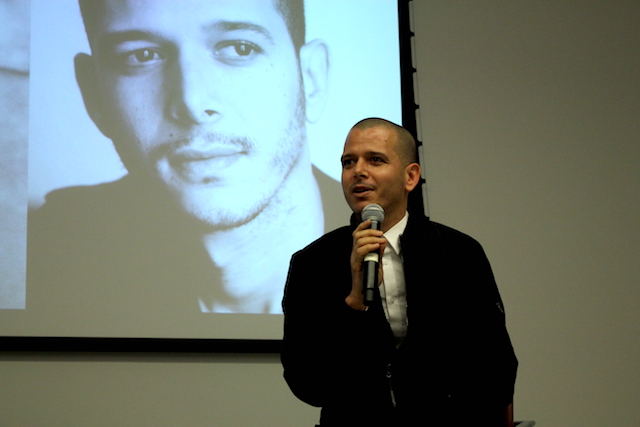Meena Alexander taught us that our stories required narratives that were true to the ruptures of our lives.

May 6, 2019
The following is part of a series of essays and reflections published on The Margins in remembrance of the life and work of poet and scholar Meena Alexander, who passed away on November 21, 2018.
1. What does it mean to fashion a self in the face of a violent world?
I remember the first time I heard Meena Alexander read at Hunter College. I was instantly mesmerized by her sing-song voice, the way she carried herself, and the fluidity and ease in which she switched tongues. Each line, an offering. At the time, I was an engineer discovering my own voice in a field where bodies like mine were often conditioned not to take up too much space.
That night, I watched and admired Meena create space with her words. I would soon come to learn that much of her work explored navigating the world in what her body made her: “female, Indian, Other.” That evening at Hunter College, Meena read “Kabir Sings in a City of Burning Towers,” a poem she wrote after 9/11. She recounted the recent wave of hate crimes against brown people in New York City. She had plans to attend a meeting of the Asian/American Research Institute at CUNY’s Graduate Center where she would have normally worn a sari, but was scared to do so in public, and instead, packed it to change into at the event. This poem interrogates that fear. “What a shame / they scared you so / you plucked your sari off, / crushed it into a ball / then spread it on the toilet floor.”
I thought about all the times we are made small, the ways we hide ourselves and crush our identities in little balls. It was the poet Kabir who sang to Meena in the bathroom mirror. “He was giving me courage to live my life,” Meena wrote. In doing so, she gave this courage to others as well.
2. Write in fragments, the fragments will save you.
The following year, I became Meena’s student in a course on memoir craft. The first text she chose for us was Theresa Hak Kyung Cha’s Dictee. The book explores the trauma of being cut off from a mother land, a mother country, a mother tongue. With Cha, Meena introduced the questions I continue to ponder in my work today: What does a narrative that emanates from trauma look like? What is the relationship between trauma, memory, and language? All the texts that followed were fragmented narratives, narratives of exile, narratives that couldn’t follow a continuous arc. My favorite was Meena’s own gorgeous lyrical memoir, Fault Lines, of a “woman cracked by multiple migrations,” traversing her life from her birth at the confluence of rivers in Allahabad, to crossing the ocean on her fifth birthday on her way to Sudan, to studying in the UK, and then making a life for herself in the United States—“writing in search of a homeland.” Meena taught us that our stories required narratives that were true to the ruptures of our lives. Her own writing demonstrated the necessity of fragments and an approach to poetry that also serves prose: “The poem needs to be sharp, as clear and faceted as broken glass. It must pick up the multitudinous cries of the world that we are.”
3. Sometimes I think I have to write myself into being. Write in order not be erased.
I returned to Fault Lines, after I heard the news of Meena’s passing. I came across a passage recounting an event in June 1990, when Meena organized a panel of women poets of color, including Audre Lorde, Kamala Das, and Claribel Alegria, to participate in an International Poetry Conference at Hunter College. Meena learned that her panel was not advertised on the general program. “What does it mean to appear, to be allowed to appear, or to be wiped out, to be wiped off the slates of publicity?” Meena asked.
“They want to suppress our names, Meena, they want to scrub us out,” Audre Lorde told her. “They cannot bear us, Meena,” she said, “those women of color who talk out.”
Despite this lack of institutional support, grassroots publicity took over, “through little leaflets the women students pass out,” and the dimly- lit auditorium became packed. Meena introduced each of the poets, and Kamala Das read first “using a borrowed flashlight, for the stage lights are defective.” I thought about all of the invisible labor required to allow women to be heard. I copied this passage and sent it to my writing salon. Meena’s death came a few short weeks after another dear writing mentor from Hunter College, Louise DeSalvo, passed away. How women’s lives are remembered and erased was on my mind. I shared Meena’s description of how that night in 1990 came into being and wrote this to my salon: “I am thinking of the ways women are going to be doing the work of grief and remembering.” We will remember.



